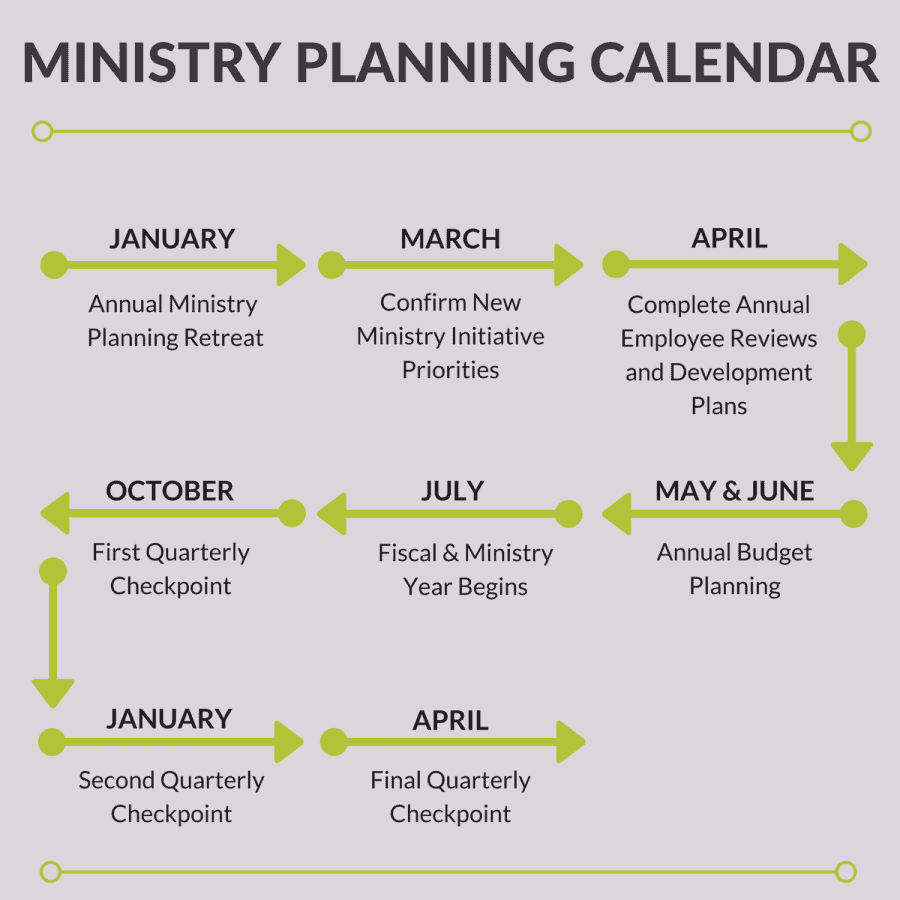In The Unstuck Church, I share a lot about the importance of planning. The root of this focus, of course, comes from the stewardship responsibility we have as church leaders. Every church has limited resources–time, space, money, volunteers, leaders, etc. Because there are limits, we have to be good stewards of those resources and invest them wisely. In the book, I reference this teaching from Jesus when it comes to planning:
“But don’t begin until you count the cost. For who would begin construction of a building without first calculating the cost to see if there is enough money to finish it? Otherwise, you might complete only the foundation before running out of money, and then everyone would laugh at you. They would say, ‘There’s the person who started that building and couldn’t afford to finish it!’” (Luke 14:28-30, NLT)
Good planning helps us make the right investment in the right ministry at the right time. I find for church leaders, though, that this is a new “muscle” that they have to develop. In other words, it’s a discipline that the team has to embrace.
With that in mind, let me suggest this rhythm for ministry planning in your church. I’m going to assume your budget year matches the calendar year. If that’s not the case, adjust accordingly.

Let me share a few personal preferences regarding this flow:
1. I like to build the ministry plan before I build the ministry budget.
Call me old school, but I think ministry should drive money rather than money driving ministry. If we prioritize what’s most important first, then we can build the budget around those priorities. It’s become difficult to re-prioritize spending, though, if you wait to build the ministry plan in the middle of the budget year.
2. I prefer using an outside facilitator for the annual planning.
I include money in my budget every year to do this. Though I obviously facilitate planning retreats all the time, I’ve learned it’s not possible for me to both facilitate the conversation and engage the process at the same time. As the leader, I need to be fully engaged and contributing my perspective rather than operating in the role of facilitator.
3. I don’t like any more than 12 leaders engaged in the planning retreat.
Any more than that and the conversations tend to come to a grinding halt. It becomes challenging to engage everyone in the discussion. Side conversations start to happen that pull the group in different directions. The biggest challenge, though, is that large groups make it almost impossible to get consensus. Once the ministry plan is developed, there will be plenty of time to involve many more people in developing and executing priority initiatives.
4. I think the ministry plans should inform individual employee wins.
That’s why the annual planning retreat should happen before the annual employee reviews and development plans are established. With that, the results of the reviews shouldn’t be a surprise to anyone. The reviews simply provide an opportunity to look back and answer the simple question: Did the wins get accomplished? If appropriate coaching took place throughout the year, there should be no surprises.
5. I’ve learned checkpoints are critical for accountability and follow through.
This is especially the case in churches. Sundays are alway coming. Because of that, worship services will always be what’s most urgent for the leadership team. With that in mind, it’s important to get checkpoints on the calendar to remind everyone what’s most urgent may not be what’s most important to the overall health of the ministry. These checkpoints don’t have to last long, but they do have to allow time for the initiative champions to provide updates on progress toward completion.
Finally, let me throw out this final challenge as it relates to developing a new ministry planning calendar.
- Someone other than the senior pastor should be the champion when it comes to driving this process.
- Ideally, that person fits the profile of the Mission-Minded Motivator that I wrote about recently. You’ll remember that that person is focused on delivering results.
- This champion isn’t responsible for developing the ministry plan, they’re just the person that makes sure the plan gets developed.
Need a Coach?
If your church needs help establishing a ministry planning calendar or you need someone to help facilitate your annual planning retreat, that’s where The Unstuck Group best supports churches.
Don’t let a lack of planning and wise counsel become the reason why your church gets stuck.
Let’s talk. We’d love to start a conversation about how we can help you take your next steps.






